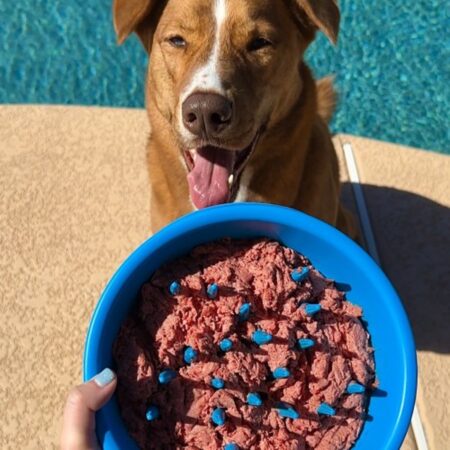
The Best Sensitive Stomach Dog Food for Your Pup
Finding the right food for your dog with a sensitive stomach can be a tricky task. Besides, you only want to ensure your furry friend is happy, healthy, and energetic. But, with so many food options in the market, knowing which food is the best for your pup’s needs can be overwhelming. So, in this article, we will guide you through the ins and outs of sensitive stomach dog food, from understanding the causes of digestive issues to identifying the best ingredients and brands to help your dog thrive.
List of The Best Sensitive Stomach Dog Food for Your Pup
Sensitive stomach dog food is a special dog food designed to be gentle on the digestive system. It typically contains easily digestible ingredients, such as hydrolyzed protein or a single source of protein, to reduce the risk of stomach upset. Below are some of the best sensitive stomach dog food options for your pup, including brands that are highly recommended by veterinarians and pet owners alike.
Here are 10 options that are highly recommended by veterinarians and pet owners alike when it comes to choosing the best sensitive stomach dog food for your pup,
1. Hill’s Science Diet Adult Sensitive Stomach & Skin:
This dog food contains a blend of highly digestible ingredients, including chicken meal, rice, and prebiotic fiber, to help support a healthy digestive system.
2. Purina Pro Plan Veterinary Diets FortiFlora Probiotic Dog Supplement:
This supplement is designed to be mixed with your dog’s regular food and contains a probiotic that helps support healthy digestion.
3. Royal Canin Veterinary Diet Gastrointestinal Low Fat Dry Dog Food:
This dog food is formulated with highly digestible proteins and prebiotics to support digestive health.
4. Blue Buffalo Basics Limited Ingredient Grain-Free Formula Dog Food:
This food is made with a single source of protein, such as turkey, and contains a limited number of ingredients to minimize the risk of stomach upset.
5. Wellness Simple Limited Ingredient Diet Dry Dog Food:
This food is made with a limited number of ingredients, including easily digestible proteins and carbohydrates, and contains no artificial colors, flavors, or preservatives.
6. Merrick Limited Ingredient Diet Grain-Free Dry Dog Food:
This food is made with a single source of protein, such as lamb or turkey, and contains no corn, wheat, or soy.
7. Taste of the Wild High Prairie Grain-Free Dry Dog Food:
This food is made with real buffalo as the first ingredient and contains no grains, gluten, or artificial flavors or colors.
8. Earthborn Holistic Great Plains Feast Grain-Free Dry Dog Food:
This food is made with real bison, which is a highly digestible source of protein, and contains no corn, wheat, or soy.
9. Canidae Pure Land Limited Ingredient Diet Dry Dog Food:
This food contains a single source of protein, such as bison, lamb, or duck, and is made without common allergens like corn, wheat, soy, or chicken.
10. Iams Proactive Health Sensitive Digestion Dry Dog Food:
This food contains a blend of highly digestible ingredients, including prebiotics and beet pulp, to support digestive health.
SEE ALSO: How Do Dogs Get Parvo? Causes, Symptoms, and Treatment
List of Home-Cooked Meals for Dogs with Sensitive Stomachs
Home-cooked meals can be a great option for dogs with sensitive stomachs, as they allow you to control the ingredients used and ensure that your dog is getting the nutrients they need without any potential allergens or irritants. Below are some ideas for home-cooked meals for dogs with sensitive stomachs:
- Cooked chicken and rice: This classic combination is easy on the stomach and provides a good source of protein and carbohydrates.
- Baked salmon and quinoa: Salmon is rich in omega-3 fatty acids, which can help support a healthy coat and skin, and quinoa is a gluten-free grain that provides a good source of protein and fiber.
- Boiled egg and steamed pumpkin: Eggs are a good source of protein and biotin, and pumpkin is rich in fiber and beta-carotene, which can support a healthy digestive system.
- Turkey and brown rice: Turkey is a lean and easily digestible protein, and brown rice is a good source of fiber and B vitamins.
- Ground turkey and lentils: Lentils are a good source of fiber and protein, and ground turkey is lean and easy to digest.
- Venison and rice: Venison is a novel protein that is low in fat and easy to digest, and rice provides a good source of carbohydrates.
- Cooked egg and yogurt: Eggs are a good source of protein, and yogurt is rich in probiotics that can support a healthy digestive system.
- Ground turkey and oatmeal: Ground turkey is a lean and easily digestible protein, and oatmeal provides a good source of fiber and B vitamins.
- Cooked chicken and pumpkin: Chicken is a lean and easily digestible protein, and pumpkin provides fiber and beta-carotene.
- Cooked cod and sweet potato: Cod is a good source of lean protein, and sweet potato provides fiber and beta-carotene.
Signs Your Dog Needs Special Food for Sensitive Stomachs
There are several signs that your dog may need special food for sensitive stomachs. Some of these signs include:
- Frequent vomiting: If your dog is vomiting regularly, this may be a sign that their current food does not agree with their stomach.
- Diarrhea: If your dog is having loose or watery stools regularly, this may be a sign of digestive upset.
- Gas and bloating: Gas and bloating are signs that your dog may need special food for sensitive stomachs. If your dog is experiencing excessive gas or bloating, this may be a sign that they are having difficulty digesting their food.
- Weight loss: If your dog is losing weight despite eating normally, this may be a sign that their body is not absorbing nutrients properly due to digestive issues.
- Poor coat and skin condition: A poor coat and skin condition can be a sign of a food allergy or other digestive issues.
- Decreased appetite: Decreased appetite is one of the signs that your dog may need special food for sensitive stomachs. If your dog is not eating as much as they normally do or is refusing to eat altogether, this may be a sign that they are experiencing digestive discomfort or another health issue.
- Lethargy: If your dog is lacking in energy or seems to be more tired than usual, this may be a sign of a digestive issue.
- Excessive licking or chewing: If your dog is excessively licking or chewing their paws or other areas of their body, this may be a sign of skin irritation or a food allergy.
SEE ALSO: Is Your Dog Dragging Butt? Here is Why!
What Causes Sensitive Stomachs in Dogs?
Sensitive stomachs in dogs can be caused by a variety of factors, including:
- Food allergies or sensitivities: Some dogs may be sensitive to certain ingredients in their food, such as grains, beef, or dairy products.
- Intestinal parasites: Parasites such as roundworms, tapeworms, and hookworms can cause digestive upset and diarrhea in dogs.
- Inflammatory bowel disease (IBD): Inflammatory bowel disease (IBD) is a chronic disorder that causes inflammation in the lining of the digestive tract, which can lead to a variety of symptoms, including vomiting, diarrhea, weight loss, and appetite changes.
- Pancreatitis: Pancreatitis is an inflammation of the pancreas that can cause vomiting, diarrhea, and abdominal pain in dogs.
- Gastric dilatation-volvulus (GDV): GDV, also known as bloat, is a serious condition in which the stomach becomes distended and twisted. It can cause vomiting, difficulty breathing, and even death if left untreated.
- Stress and anxiety: Stress and anxiety can also contribute to digestive issues in dogs, as they can disrupt the normal functioning of the digestive system.
Ingredients in Dog Food That Can Upset Dog Stomachs
Several ingredients in dog food can upset your dog’s stomach, including:
- Corn: Some dogs may have difficulty digesting corn, which can lead to vomiting, diarrhea, and other digestive issues.
- Wheat: Wheat is a common ingredient in many commercial dog foods, but it can cause digestive upset in some dogs. Wheat contains gluten, which is a protein that can be difficult for some dogs to digest.
- Soy: Some dogs may be sensitive to soy, which can cause digestive upset and allergic reactions.
- Dairy products: Some dogs are lactose intolerant, which means that they cannot digest lactose, a sugar found in milk and other dairy products.
- Artificial sweeteners: Some artificial sweeteners, such as xylitol, can be toxic to dogs and cause digestive upset and other health problems.
- Excessive fat: High-fat diets can cause digestive upset in dogs, including diarrhea, vomiting, and pancreatitis.
- Certain proteins: Some dogs may be sensitive to certain proteins, such as beef, chicken, or lamb.
- Gluten: Gluten is a protein found in grains such as wheat, barley, and rye. It’s a common ingredient in many commercial dog foods, but it can cause digestive upset and allergic reactions in some dogs.
Transitioning Your Dog with Sensitive Stomach to a Different Food
Transitioning your dog with a sensitive stomach to a different food should be done gradually over several days or weeks. This will allow your dog’s digestive system to adjust to the new food and minimize the risk of digestive upset.
Start by mixing a small amount of the new food with your dog’s current food, and gradually increase the amount of new food over several days or weeks while decreasing the amount of the old food.
Tips for Buying Dog Foods for Sensitive Stomachs
Here are some tips for buying dog foods for sensitive stomachs:
- Look for limited-ingredient diets: These types of diets typically contain fewer ingredients and are easier for dogs with sensitive stomachs to digest.
- Choose high-quality proteins: When choosing a protein source for your dog, look for meats that are hormone- and antibiotic-free, such as chicken, turkey, beef, lamb, or fish. These proteins are easily digestible and less likely to cause allergic reactions.
- Avoid common allergens: Ingredients like corn, wheat, soy, and dairy products can cause allergic reactions in some dogs, so it’s best to avoid these ingredients if your dog has a sensitive stomach.
- Read the label: Make sure to read the label carefully and choose foods that are free of artificial preservatives, colors, and flavors, as these can cause digestive upset in some dogs.
- Talk to your veterinarian: Talking to your veterinarian is important when transitioning your dog with a sensitive stomach to a new diet as your veterinarian can provide expert advice on the best type of food for your dog and can help you monitor your dog’s health during the transition.
- Consider a hydrolyzed protein diet: These diets are formulated with proteins that have been broken down into small peptides, which are easier for dogs with sensitive stomachs to digest.
FAQs:
Q. What is the easiest food for puppies to digest?
For puppies with sensitive stomachs, the easiest food to digest is typically a high-quality, limited-ingredient diet that contains a single source of easily digestible protein.
Some good options include chicken, turkey, lamb, or salmon, as these proteins are generally well-tolerated by puppies.
Q. What is the best protein for a puppy with a sensitive stomach?
The best protein for a puppy with a sensitive stomach is typically a novel protein, such as venison, lamb, or turkey.
These proteins are less common in commercial pet foods, so they are less likely to trigger an allergic reaction in your puppy.
Q. Is Pedigree good for dogs with sensitive stomachs?
Pedigree dog food is not typically recommended for dogs with sensitive stomachs.
While Pedigree does offer a variety of formulas that are formulated to meet the nutritional needs of adult dogs, the ingredients in Pedigree dog food are not as high-quality as other brands that are designed specifically for dogs with sensitive stomachs.
Pedigree dog food contains corn, wheat, and soy, which can be difficult for some dogs to digest and may cause digestive upset.
Q. What is the best dog treat for sensitive stomachs?
The best dog treats for sensitive stomachs is typically a treat that is low in fat and contains a single source of high-quality protein.


